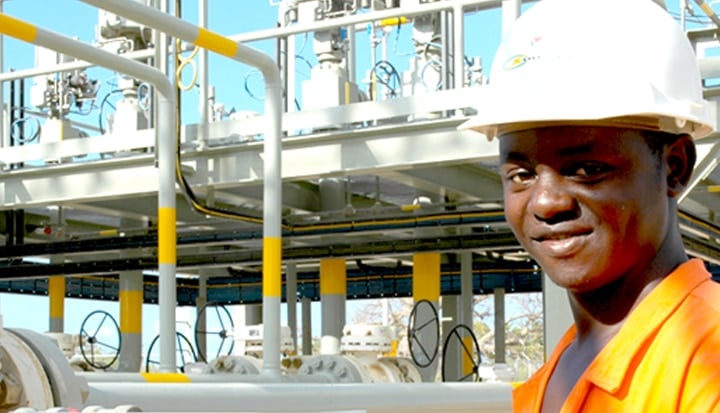“Now I have a steady income there is no hassle of meeting my financial obligations to the family or to dependents. In Africa, if you have a job, you usually have a lot of dependents, not only your family.”
Christopher Wangul has been working at Athi Steel for more than 14 years.
HAVING A JOB
In the blistering environment of molten steel and furnaces, Christopher Wangul supervises the training of workers at Athi Steel, one of Kenya’s largest steel mills, just outside Nairobi.
Every morning he oversees a ‘toolbox meeting’ with workers where they talk through health and safety processes before each shift. Christopher started with the company when the business was first set up in the late 1990s. At that time there were 29 employees in the company. Today it has grown to nearly 800 employees – and Christopher has grown with it. He is now the Human Resources Officer and plays an important role in hiring staff. Crucially, the job offers him a steady incomewith which to educate his children and support his family, including an extended family of nephews and nieces.
Christopher is in the enviable position of having a steady job as the rate of unemployment in Kenya is very high. Although Kenya’s growth rate is nearly 5 per cent a year, around 45 per cent of the population live in poverty on US$1 a day.
Jobs offer a way out of poverty and according to a recent World Bank report, nearly 90 per cent of jobs are created in the private sector. Successful businesses such as Athi Steel in Kenya are vital for creating jobs for people like Christopher.
CDC’S INVESTMENT IN ATHI STEEL
|
l |
“There were many challenges in our first phase in Kenya. We had no track record so getting confidence from any investor or any financial institution was a real problem,”
Ravi Gupta, co-founder, Athi Steel
There are serious challenges to building a business as successful as Athi Steel.
Businesses in developing countries often struggle to find the investment they need to grow. CDC is the UK’s development finance institution and it supports the building of businesses throughout Africa and South Asia creating jobs and making a lasting difference to people’s lives in some of the world’s poorest places. A patient and pioneering investor, CDC first backed Athi Steel in 1998 and more recently invested nearly US$1.3m in 2006 through local fund manager The Abraaj Group. CDC has had a long relationship with the team at The Abraaj Group.
Patient investors are good for the country. They teach people that you can invest over a 10-year period and that even if you do not get your immediate cash back in the first year, in the long run it all adds up to a good overall return.
Peter Njoka, The Abraaj Group
BUSINESS SUCCESS CREATES MORE JOBS
Athi Steel’s business model of sourcing local scrap metals and making them into new steel products has proved to be very successful. It now produces over 700 high qualityproducts including nuts and bolts, building materials and water borehole pipes.
The company is now East Africa’s leading steel producer with exports heading to other parts of Africa. Turnover has risen from US$188,000 in the 1990s to US$18m today, due in part to the addition of a modern continuous rolling mill facility that produces steel rods used in construction. Melting capacity has risen from 4,000 tonnes to 120,000 tonnes a year and the number of people employed has risen from 29 to nearly 800. The expansion also means that Athi Steel can buy more scrap from Kenya’s thousands of metal collectors to whom it also provides indirect employment.
DEVELOPMENT IMPACT AND FINANCIAL RETURN
“As investors, we know that financial returns are part of business success. That goes hand-in-hand with development impact and creating jobs,”
Diana Noble, CDC’s CEO.

Thanks, in part, to the continued support of CDC and The Abraaj Group, Athi Steel is now a leading steel producer in East Africa. There is still room for further expansion. Ravi Gupta, one of the founders, plans to set up a new plant on 200 acres in Tanzania – several times larger than the current site in Kenya – with the aim of exporting steel products to the Middle East.
INVESTMENT DATA
|
Investee Company |
Athi River Steel Plant Ltd |
|
Location |
Kenya, Africa |
|
Fund |
Aureos East Africa Fund |
|
Fund Manager |
The Abraaj Group |
|
CDC commitment to the Fund |
US$8m |
|
Date of commitment |
2003 |











